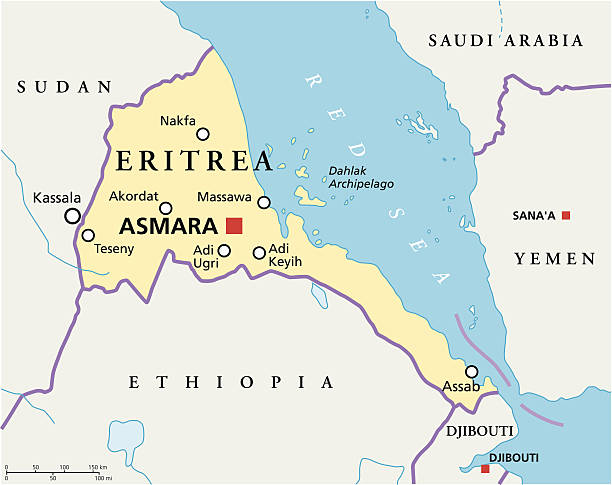International Relations
UN Concerns Over Eritrean Deportations from Israel
- 09 Sep 2023
- 6 min read
For Prelims: International law, UN Refugee Agency (UNHCR), Principle of non-refoulement:
For Mains: Significance of International law in refugee rights
Why in News?
The United Nations has expressed its concern over the possible mass deportations of Eritrean asylum seekers from Israel, following violent clashes between rival factions of the Eritrean community in Tel Aviv.
- The UN refugee agency said that such an act of refoulement would violate international law.
What Prompted the UN's Concern?
The United Nations Refugee Agency (UNHCR) said it was “deeply concerned” about clashes that occurred when a demonstration against an Eritrean government event turned violent.
- The UNHCR called for calm and urged all parties involved to avoid actions that could escalate the situation further.
UN Refugee Agency (UNHCR):
- The Office of the United Nations High Commissioner for Refugees (UNHCR) was created in 1950, during the aftermath of the Second World War, to help millions of Europeans who had fled or lost their homes.
- In 1954, UNHCR won the Nobel Peace Prize for its groundbreaking work in Europe. But it was not long before we faced our next major emergency.
- In 1981, it received a second Nobel Peace Prize for what had become worldwide assistance to refugees.
What is International Law and Policy on Asylum and Deportation?
- Eritrean Deportations and Breach of International Law:
- Principle of non-refoulement:
- The principle of non-refoulement (1951 Refugee Convention and its 1967 Protocol) is a well-established concept in international law, and in particular in the context of refugee law.
- Under international human rights law, the principle of non-refoulment guarantees that no one should be returned to a country where they would face torture, cruel, inhuman, or degrading treatment or punishment, and other irreparable harm.
- Israel is a party to these treaties and has an obligation to respect, protect, and fulfill the rights of refugees and asylum seekers within its territory or effective control.
- By expelling Eritreans, Israel would violate the principle of non-refoulement, as Eritrea is considered one of the world’s most authoritarian states, where human rights violations are widespread and severe.
- Eritreans who are returned to their country of origin could face torture, ill-treatment, indefinite military service, political repression, or even death.
- The principle of non-refoulement (1951 Refugee Convention and its 1967 Protocol) is a well-established concept in international law, and in particular in the context of refugee law.
- Right to asylum:
- The right to asylum is a fundamental human right that is recognized by the Universal Declaration of Human Rights.
- The right to asylum implies that every person has the right to seek and enjoy protection from persecution in other countries.
- By expelling Eritreans en masse, Israel would violate the right to asylum, as it would deny them the opportunity to seek and enjoy protection from persecution in Israel or in other safe countries.
- Principle of non-refoulement:
Note:
- India is not a party to the 1951 Refugee Convention and its 1967 Protocol, the key legal documents pertaining to refugee protection under International Law.
- Further, Article 21 of the Constitution encompasses the right of non-refoulement.
- India does not have national asylum legislation.
- However, The Refugee and Asylum Bill, 2019, was introduced in Rajya Sabha but has yet to be passed by the Parliament.
International Law:
- About:
- Coined by Jeremy Bentham in 1780.
- Governs relations between countries (states).
- Aims to benefit citizens and promote friendly relations.
- Resolves international problems through cooperation and peaceful means.
- Aims:
- Protect fundamental humanitarian rights.
- Aims to benefit citizens and promote friendly relations.
- Resolves international problems through cooperation and peaceful means
- Subjects of International Law:
- Individuals: Common people of any state.
- International Organizations: e.g. United Nations.
- Multinational Companies: Operate in multiple countries.
Key Facts About Eritrea:
- Eritrea is a country in the Horn of Africa, located on the Red Sea Coast.
- Capital: Asmara.
- It shares borders with Ethiopia, Sudan, and Djibouti.
- The country also shares maritime borders with Saudi Arabia and Yemen.
- It is a former Italian colony that became part of a federation with Ethiopia in 1947, In 1952 Eritrea was annexed by Ethiopia. The country became independent in 1993.
UPSC Civil Services Examination Previous Year Question (PYQ)
Prelims
Q. Consider the following: (2011)
- Right to education
- Right to equal access to public service
- Right to food.
Which of the above is/are Human Right/Human Rights under the “Universal Declaration of Human Rights”?
(a) 1 only
(b) 1 and 2 only
(c) 3 only
(d) 1, 2 and 3
Ans: (d)
Mains:
Q. “Refugees should not be turned back to the country where they would face persecution or human right violation”. Examine the statement with reference to ethical dimension being violated by the nation claiming to be democratic with open society. (2021)






-min.jpg)